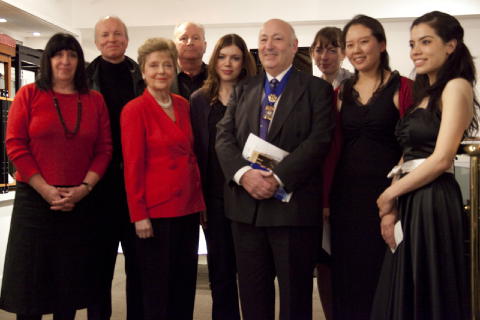|
A CONSISTENTLY HIGH STANDARD

JULIAN JACOBSON reports from the
2009 Beethoven Intercollegiate Piano Competition
The Beethoven Piano Society of Europe's annual Beethoven Intercollegiate Piano Competition, held again this year at the Blüthner Piano Centre in London's West End [29 November 2009] by kind courtesy of Roger Willson, produced a consistently high standard, without perhaps revealing an outstandingly Beethovenian personality -- yet! But several are well on the way.
Seven conservatoires were represented by the winners of their own internal Beethoven competitions, with each candidate having to prepare one complete sonata and an obligatory Bagatelle, this year the G major Op 126 No 1. Now that's a piece to trap the unwary, and every single one fell into the trap of bringing the main theme back too slowly after the little improvisatory flourish -- as I heard the distinguished President of the Jury, Jerome Rose, telling several of them afterwards. Some candidates also played it too romantically or fancifully, not finding its still centre.
The 'main course' sonatas all gave considerable pleasure. Polina Bogdanova, from the Royal Northern College, played the A flat Op 110 with impressive accuracy and control; if her first movement was rather small-toned and unimaginative, the performance grew in personality and commitment, and the treacherous Scherzo held no terrors for her. She was awarded joint third prize.
From Trinity College, Leo Nicholson (after a nicely understated Bagatelle) offered the rarely-heard G major Sonata, Op 31 No 1, which he played with commendable accuracy and musical acumen; I thought he was unlucky not to be placed -- even if the first movement needed a little more sense of urgency in order to 'earn' the exquisitely comical relaxation of the Adagio grazioso second movement.
Caterina Grewe (Royal College) displayed warm tone in the Bagatelle and always gave the impression of listening to herself. In Op 31 No 2 (the so-called Tempest Sonata), a fine, driving, well-paced first movement was followed by an Adagio just too flowing to convey its august solemnity; but her Finale was very good, just a little lacking in tonal weight in the fortes but it built well and she was a deserving winner of the second prize.
The Royal Academy's Olga Stezhko gave us an over-emotional Bagatelle followed by an Appassionata that peaked in the heavenly variations of the second movement where there was some beautiful playing. Elsewhere the playing was less settled, with a lack of rhythmic rigour in the first movement (though the development was excellent), and a Finale that did not always sound in full control. Nevertheless the high quality of her best playing earned her joint third prize.
From the Birmingham Conservatoire, Ya-Ting Lo showed a warm heart and a sense of inner rhythm in her Bagatelle that I much liked. More experience is needed to do the E major Sonata, Op 109, full justice, but even here one could warm to her instinctive musicality and crisp articulation (though this was sometimes obscured by overpedalling). The Prestissimo second movement was rather too cautious for its visionary character to emerge, but the Finale again had an engagement that showed what she can become.
Grace Yeo's Bagatelle, for all its mature sense of line and excellently produced tone, was ultimately a little too withdrawn to make its full effect: but this Guildhall School student had something in reserve. The marvellous D major Sonata Op 10 No 3 suited her intelligent, disciplined pianism to perfection and brought playing that was polished, graceful (she caught its Haydnesque moments wonderfully) and always well-paced. If the first movement was not quite Presto and the slow movement lacked a measure of gravitas, the Minuet and Rondo finale increasingly caught fire, to the point where I was pretty sure she would be the first prizewinner -- as turned out to be the case! Her warmly projected musicality also netted her the Audience Prize.
Finally from the Royal Scottish Academy, Theodoros Iossifidis produced a firm and unpretentious Bagatelle followed by the second Op 110 of the day. This too had strength and a sense of purpose and he never prettified the music. Unfortunately he had a few lapses of concentration, and there was a feeling that his interpretation had not quite settled, despite many excellent, and truly Beethovenian, qualities.

Jury and contestants at the Beethoven Intercollegiate Piano Competition. From left to right: Angela Brownridge, Ronan Magill, Eugenie Maxwell, Jerome Rose, Olga Stezhko, Maurice Summerfield, Polina Bogdanova, Grace Yeo and Katarina Grewe. Photo © 2009 Monooka
|
The distinguished Jury consisted of the renowned American pianist Jerome Rose, Founder and Director of the International Keyboard Institute and Festival at Mannes College of Music, New York City, who is this year also on the jury of the great Beethoven Piano Competition in Bonn, and British pianists Ronan Magill and Angela Brownridge. Maurice Summerfield, the Master of the Worshipful Company of Musicians, presented the Company's Beethoven Medal to Grace Yeo and Eugenie Maxwell, Vice President of the BPSE, presented the prizes. Personally I look forward to hearing every one of these players again: they all have something to say.
Copyright © 15 December 2009 Julian Jacobson,
London UK

|

